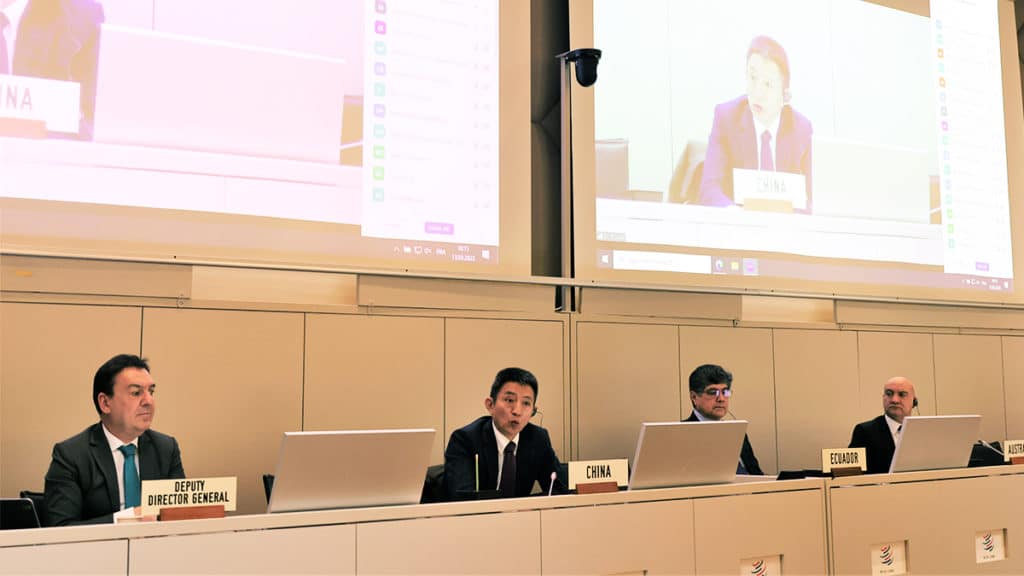Los participantes en el Diálogo sobre los Plásticos intercambian ideas acerca de los resultados de la CM13 y dan la bienvenida a los Estados Unidos como copatrocinador

La Decimotercera Conferencia Ministerial (CM13), que tendrá lugar el año que viene, será para la OMC una oportunidad de obtener resultados concretos, pragmáticos y eficaces tendentes a reducir la contaminación producida por los plásticos y atender las preocupaciones ambientales, dijeron los participantes en el Diálogo Informal sobre la Contaminación Producida por los Plásticos y el Comercio de Plásticos Ambientalmente Sostenible en una reunión celebrada el 13 de marzo. Los asistentes mantuvieron su primer debate específico sobre la estructura de los resultados de la CM13 y dieron la bienvenida a los Estados Unidos como nuevo copatrocinador de la iniciativa.
(de momento sólo en inglés)
The meeting also heard from World Wildlife Fund (WWF) Special Envoy Marco Lambertini, who delivered a keynote speech. He emphasized the urgency of the plastics pollution issue and called for the WTO to contribute to global efforts to combat it.
Coordinators’ remarks
The ambassadors of three coordinating members– Ecuador, China, and Australia– highlighted the positive spillover effects of the Dialogue, noting it has brought together officials from various members in the fields of trade, environment, customs, and industry. They emphasized the Dialogue’s objective of supporting other significant international initiatives in this area, particularly the ongoing multilateral negotiation process at the UN Intergovernmental Negotiating Committee where participants are seeking to achieve a legally binding instrument by the end of 2024 to put an end to plastics pollution.
The ambassadors encouraged active participation from all participants in shaping the outcomes of MC13, emphasizing the need to incorporate developmental elements and establish a plan for providing capacity building and technical assistance to developing members, in particular small island developing states (SIDS) and least developed countries (LDCs).
They emphasized that with MC13 less than a year away, it is critical to generate concrete ideas and formulate a set of policy recommendations to reduce plastics pollution and encourage the adoption of substitute re-use models and sustainable solutions to harmful plastic products.
MC13 is due to take place in Abu Dhabi, United Arab Emirates, during the week of 26 February 2024
During his speech, Mr. Lambertini of the WWF highlighted alarming facts that underscore the severity of the plastic pollution crisis. He noted that over 8 million metric tonnes of plastic waste flows into the ocean every year, negatively impacting 90% of marine biodiversity and threatening the overall health of the planet’s ecosystem. The lack of global regulations on plastics pollution have led to different standards across a wide range of goods, preventing effective tracing, recycling, and reuse of plastic materials, he noted, stressing the need to adhere to high common standards to phase out the most problematic plastic products and provide financial support to LDCs. He emphasized the WTO has a critical role to play in this endeavour.
DDG Paugam highlighted the world’s rapidly growing interest in the issue of plastic pollution, as evidenced by the recent adoption of initiatives that include plastics elements, such as the marine biodiversity agreement at the United Nations. He emphasized that the WTO cannot stand on the sidelines and noted the important work developed by the Dialogue in the last two years in mapping trade interlinkages and potential solutions to the plastics pollution problem throughout the full life cycle of plastics. He also stressed the need for tangible outcomes to be achieved at MC13 as called for by the trade ministers from the Dialogue’s co-sponsors.
During the meeting, the participants welcomed the announcement of the United States’ co-sponsorship of the Dialogue, seeing it as a clear indication of the growing support for the initiative among members.
First focused discussions on possible MC13 outcomes
Facilitators of the three work streams, namely the United Kingdom, Colombia, and Australia, provided an update on the latest discussions within each work stream and shared their views on the next steps. The three work streams cover cross-cutting issues such as international cooperation, capacity building and transparency, issues related to reduction of plastics pollution and a full life-cycle approach to eliminating such pollution, issues regarding promotion of environmentally sustainable trade in plastic alternatives and substitutes, as well as technologies required to address plastics pollution.
Several participants suggested that key components of the MC13 outcomes should include a political statement highlighting commonly identified priorities as well as a call for action, voluntary pledges of domestic actions, and collective efforts in plastics reduction. Additionally, they recommended the inclusion of specific trade actions such as the identification of harmful plastic goods targeted by trade measures, a compendium of best practices, and a set of Harmonized System (HS) codes for substitutes of harmful plastic goods to recommend to the World Customs Organization.
During the meeting, some participants expressed the need for more in-depth discussions on plastics substitutes, with a focus on phasing out fossil-fuel products, and providing technical assistance to developing members to achieve this. Others highlighted the synergies between the Dialogue and other international initiatives, stressing the importance of avoiding duplication of efforts or negatively impacting other global negotiation processes.
Some participants emphasized the urgency of recommending new HS codes to the World Customs Organization in line with its ongoing reform efforts. The importance of providing technical assistance to LDCs and SIDS was also underscored by many.
In conclusion, the coordinators emphasized the importance of keeping the Dialogue open and inclusive. They encouraged more LDCs and SIDS to participate in the needs evaluation survey and stressed the need for MC13 outcomes to address the needs of the most vulnerable populations.
Participants’ suggestions on MC13 outcomes have been compiled in an evolving document INF/TE/IDP/RD/120. Coordinators presented their own vision of the path forward and potential structure of MC13 outcomes. They suggested the vision would be further refined based on the discussions held in the meeting of the Dialogue and presented to co-sponsors again in the near future.
Next meeting
The next meeting of the Dialogue is scheduled for 27 April. It will be a joint workshop with the UN Environment Programme with the focus on reducing the use of harmful plastic products.
More information about the Plastics Dialogue is available on its dedicated page.















